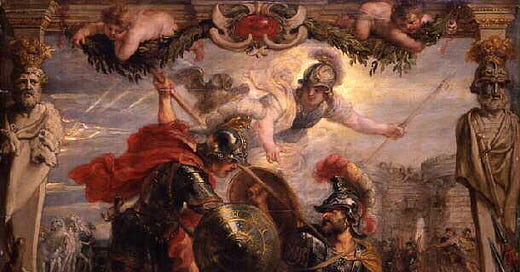Achilles is on the way back from being tricked by Apollo into leaving the walls of Troy long enough to let the Trojans get back inside the walls. Hektor waits for him.
His father and mother both plead with him to come back inside the walls. That would seem to be the smart thing to do: after all, they’ve been able to hold off the Greeks for a decade by staying behind their walls. But Hektor now regrets not having listened to Polydamos, who’d urged him to get back inside the walls much earlier. He’s afraid others will say that
“He kept his pride and lost his men, this Hektor!” Translated by Robert Fitzgerald
Hektor considers his options. Should he disarm and put down his shield and helm, and offer to give up Helen and the treasure Paris stole from Menelaus? Fortunately, he doesn’t go with that: Achilles has made it crystal clear he will show no mercy to anyone. Well, then, the best Hektor can hope for is to fight Achilles and leave it to Zeus.
Hektor stands by the wall, but when Achilles gets close, he looses his nerve, and breaks and runs. Three times he runs around the walls of Troy, chased by Achilles. And his only chance to win is, indeed, Zeus taking his side.
the two men ran, pursuer and pursued, and he who fled was noble, he behind a greater man by far. Translated by Robert Fitzgerald
Zeus is inclined to save Hektor because he has been a good and pious man, and is clearly outclassed. But just as Hera convinced Zeus earlier not to save his own descendant, Sarpedon, Athena convinces him not to save Hektor, in both cases because the men were fated to die. She tricks Hektor into stopping and making a stand, by taking on the form of Hektor’s brother Deiphobos, which convinces him he won’t be alone.
Before they fight, Hektor asks only that the victor return the body of the vanquished to his own people. Achilles, certain of the victory, refuses.
Achilles throws his spear at Hektor and misses, but Athena returns his spear to him. Meanwhile, Hektor’s spear hits Achilles mid-shield, and it bounces off. He asks Deiphobos for another spear, but since he was never there, doesn’t get one.
Hektor realizes he’s a goner, but figures he’ll at least go down with his sword swinging. He charges, but Achilles easily gets him in the neck with his spear. Once more, with his dying breath, Hektor begs Achilles to give his body to his parents. Achilles doesn’t relent, and strips Hektor’s armor. Then the other Greeks come up to the body and takes turns jeering and stabbing the body. Finally, Achilles drags Hector’s body behind the chariot while his father, mother and wife all watch.
It’s hard to read, not so much for the killing, which is where Achilles is justified. The cruelty of the desecration seems over the top. In fact, the gods themselves seem to agree. Despite everything Achilles does, they manage to preserve the body whole, and preserve it from animals; just as they did earlier for the body of Patroclos, and before that, for the body of Sarpedon.
On the one hand, I want to say Achilles is being hypocritical, since Hektor was not killing any more of his enemy than Achilles was. On the other hand, his brother Alexander (Paris) was guilty of starting the war, and his father, Priam, refused to end it.
Is this all about Patroclos? To a certain extent, yes. But not just because Patroclos was his best friend and brother-in-arms. (No, I’m not going to go the route of ‘lovers.’ While it could have been a possibility, and the Romans of my first century time-frame would have been aware of the stories, it is not actually in the Iliad itself.)
In his grieving Patroclos right after he died, he brings up something I hadn’t taken seriously before. Achilles has a son, whom he left with his mother (Deidamia, who is actually his wife in some of the earliest stories in the Cypria, 7th century BC), knowing that by choosing glory by fighting at Troy, he would never come home alive.
He had always assumed that Patroclos would live! Not only that, but he had expected Patroclos to become his son’s protector, and introduce him to the inheritance he had from his father. Achilles expected that his own father, Peleus, would be too old and weak to do much of that. In mourning Patroclos, he was also mourning that his son would grow up without a male protector.
Meanwhile, Andromache goes to Hektor’s chambers and sees the delicate, fine garments she and her women had made for him.
“These, by heaven, I’ll burn to the last thread in blazing fire! They are no good to you, they cannot cover you in death. So let them go, let them be burnt as an offering from Trojans and their women in your honor.” Translated by Robert Fitzgerald





That scene is clear proof that the gods' spite is nursed until it afflicts all around them like a raging dumpster fire. The Greek gods are petty, spoiled children that never grow up, treating the humans like disposable toys.
"Let's stick these two heroes in a situation where they both lose."
"Sounds good."
When they grant a prophecy for humans to avoid their doom, they give it to someone who will never be believed. Or they send sea serpents to kill the prophet who warns about the Trojan Horse.
It must have been a dreary world that the ancient Greeks inhabited. 🫤
If Achilles genuinely believed the death of Patroclos has robbed him not just of his best friend and brother in arms, but if the man he believes would be the guardian for his son, then it indeed is little wonder why he's so wholly unmerciful and disrespectful to Hektor in this moment.